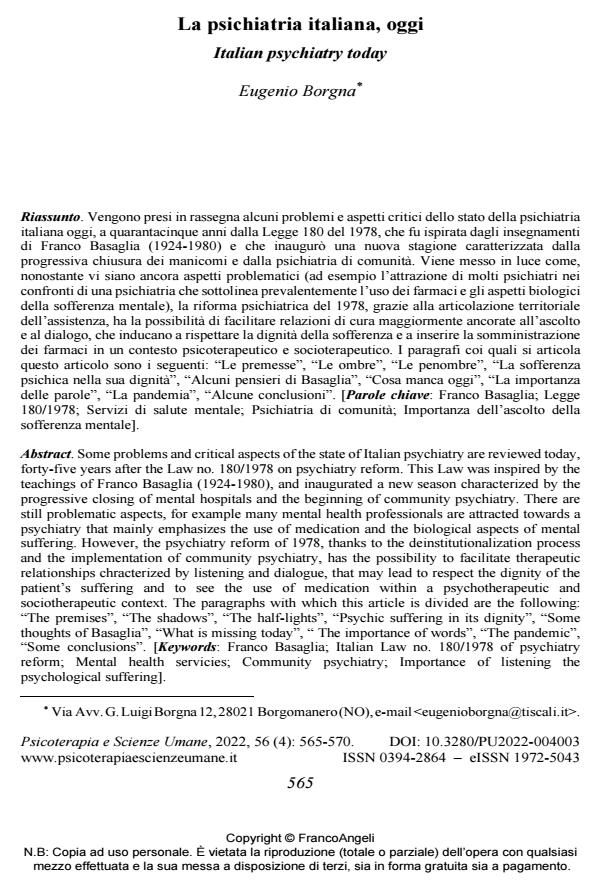Italian psychiatry today
Journal title PSICOTERAPIA E SCIENZE UMANE
Author/s Eugenio Borgna
Publishing Year 2022 Issue 2022/4
Language Italian Pages 6 P. 565-570 File size 260 KB
DOI 10.3280/PU2022-004003
DOI is like a bar code for intellectual property: to have more infomation
click here
Below, you can see the article first page
If you want to buy this article in PDF format, you can do it, following the instructions to buy download credits

FrancoAngeli is member of Publishers International Linking Association, Inc (PILA), a not-for-profit association which run the CrossRef service enabling links to and from online scholarly content.
Some problems and critical aspects of the state of Italian psychiatry are reviewed today, forty-five years after the Law no. 180/1978 on psychiatry reform. This Law was inspired by the teachings of Franco Basaglia (1924-1980), and inaugurated a new season characterized by the progressive closing of mental hospitals and the beginning of community psychiatry. There are still problematic aspects, for example many mental health professionals are attracted towards a psychiatry that mainly emphasizes the use of medication and the biological aspects of mental suffering. However, the psychiatry reform of 1978, thanks to the deinstitutionalization process and the implementation of community psychiatry, has the possibility to facilitate therapeutic relationships chracterized by listening and dialogue, that may lead to respect the dignity of the patient’s suffering and to see the use of medication within a psychotherapeutic and sociotherapeutic context. The paragraphs with which this article is divided are the following: "The premises", "The shadows", "The half-lights", "Psychic suffering in its dignity", "Some thoughts of Basaglia", "What is missing today", "The importance of words", "The pandemic", "Some conclusions".
Keywords: Franco Basaglia; Italian Law no. 180/1978 of psychiatry reform; Mental health servicies; Community psychiatry; Importance of listening the psychological suffering
- Le ragioni della lettera appello dei direttori dei Dipartimenti di Salute Mentale Massimo Cozza, in PSICOTERAPIA E SCIENZE UMANE 1/2023 pp.27
DOI: 10.3280/PU2023-001003 - La pratica del cambiamento Peppe Dell’Acqua, in PSICOTERAPIA E SCIENZE UMANE 1/2023 pp.31
DOI: 10.3280/PU2023-001004 - Il futuro dei Servizi psichiatrici Pietro Pellegrini, in PSICOTERAPIA E SCIENZE UMANE 1/2023 pp.59
DOI: 10.3280/PU2023-001006 - Psichiatria: crisi specifica o crisi generalizzata? Benedetto Saraceno, in PSICOTERAPIA E SCIENZE UMANE 1/2023 pp.67
DOI: 10.3280/PU2023-001007 - La "mitodologia" della Legge 180 e la necessità di una rivoluzione culturale Franco Veltro, in PSICOTERAPIA E SCIENZE UMANE 2/2023 pp.285
DOI: 10.3280/PU2023-002006 - La necessità del cambiamento Andrea Angelozzi, in PSICOTERAPIA E SCIENZE UMANE 4/2022 pp.545
DOI: 10.3280/PU2022-004002
Eugenio Borgna, La psichiatria italiana, oggi in "PSICOTERAPIA E SCIENZE UMANE" 4/2022, pp 565-570, DOI: 10.3280/PU2022-004003